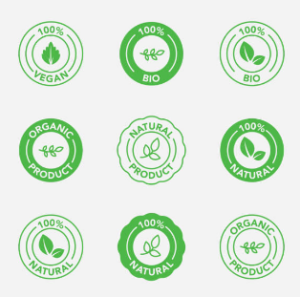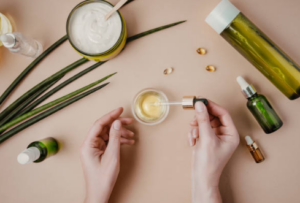Clarifying the Differences and Benefits in Clean Beauty

The world of beauty and skincare is becoming increasingly conscious of the ingredients used in products. Many consumers are seeking cleaner, more sustainable, and environmentally friendly options. In response, the terms “organic” and “natural” have gained prominence, but what do they really mean, and how do they impact clean beauty? In this comprehensive guide, we’ll delve into the differences between organic and natural beauty products, and the benefits they offer for your skin, health, and the planet.
Understanding Organic Beauty
In the beauty industry, “organic” signifies that a product is derived from ingredients that are grown and processed following specific organic farming standards. These standards can vary slightly from country to country, but they typically involve:
No Synthetic Chemicals: Organic beauty products are manufactured without the use of synthetic pesticides, herbicides, and fertilizers. They are also free from genetically modified organisms (GMOs). This absence of synthetic chemicals distinguishes them from conventional beauty products, which often contain artificial additives and harsh substances.
Sustainable Farming Practices: Organic farming practices prioritize sustainability and responsible land management. They often include techniques such as crop rotation, organic matter incorporation, and natural pest control methods. These practices help maintain soil health, minimize erosion, and reduce environmental impact.
No Irradiation or Sewage Sludge: Organic ingredients are not subjected to irradiation (exposure to ionizing radiation) or treated with sewage sludge. Irradiation is a common practice in conventional agriculture to kill pathogens, while sewage sludge may be used as a soil conditioner. Organic standards prohibit these practices, further emphasizing their commitment to environmentally friendly and health-conscious farming methods.
Animal Welfare: Organic standards also extend to animal welfare in some cases. Organic beauty products may be cruelty-free, meaning they are not tested on animals, aligning with ethical values and sustainability.
Benefits of Organic Beauty
Reduced Chemical Exposure: One of the primary advantages of using organic beauty products is the reduction in exposure to synthetic chemicals. These products are formulated with natural and organic ingredients, minimizing the risk of skin irritation and potential long-term health concerns associated with chemical exposure.
Environmentally Friendly: Organic farming practices prioritize soil health, biodiversity, and sustainable land use. By choosing organic beauty products, consumers indirectly support these sustainable agricultural methods, contributing to reduced environmental degradation and healthier ecosystems.
Cruelty-Free: Many organic beauty brands are committed to cruelty-free testing and manufacturing practices. This means their products are not tested on animals, aligning with ethical and animal welfare values.
Nutrient-Rich Formulas: Organic ingredients are often rich in vitamins, antioxidants, and minerals. These nutrients can provide potential benefits for your skin, such as hydration, protection against free radicals, and overall skin health improvement.
Personal Well-Being: Choosing organic beauty products can promote personal well-being by reducing exposure to potentially harmful chemicals. This aligns with a holistic and health-conscious lifestyle.
It’s important to note that while organic beauty products offer numerous advantages, they may also come at a higher price point compared to conventional beauty products due to the cost of organic farming practices and certification processes. However, many consumers find the investment worthwhile for the health benefits, environmental impact, and ethical considerations associated with organic beauty choices.

Exploring Natural Beauty
Natural beauty products are crafted from ingredients that are sourced directly from nature. These ingredients can include plant extracts, essential oils, minerals, and other naturally occurring substances. The essence of natural beauty products is to utilize nature’s resources without extensive chemical processing. While there’s no universal definition of “natural” in the beauty industry, natural products typically adhere to the following principles:
Avoidance of Synthetic Chemicals: Natural beauty products generally exclude synthetic chemicals, artificial fragrances, and harsh additives. Instead, they rely on naturally derived ingredients to provide skincare benefits.
Responsible Sourcing: Ethical and sustainable ingredient sourcing is a common practice among natural beauty brands. This often involves supporting fair trade initiatives and choosing ingredients that are harvested and processed responsibly to minimize environmental impact.
Transparency: Many natural beauty brands prioritize transparency by providing detailed ingredient lists, allowing consumers to make informed choices about the products they use on their skin.
Gentleness on Skin: Natural beauty products are often associated with being gentler on the skin, as they are less likely to cause irritation and allergic reactions compared to products with synthetic chemicals.
Benefits of Natural Beauty Products
Gentle on Skin: Natural beauty products are known for their gentle formulations, making them suitable for individuals with sensitive skin. They minimize the risk of skin irritation and allergic reactions.
Environmentally Conscious: Sourcing ingredients from nature can have a lower environmental impact compared to the intensive farming practices of conventional agriculture. This aligns with sustainability and eco-friendliness.
Transparency and Ingredient Clarity: Many natural beauty brands prioritize ingredient transparency. They aim to provide consumers with clear information about the sourcing and processing of their ingredients, allowing for informed choices.
Eco-Friendly Packaging: Some natural beauty brands take eco-friendliness a step further by using sustainable and biodegradable packaging materials. This helps reduce plastic waste and promotes environmental responsibility.
Holistic Well-Being: The use of natural ingredients in beauty products aligns with a holistic approach to well-being. It reflects a commitment to using pure and unadulterated resources that are in harmony with nature.
It’s important to note that while natural beauty products offer numerous benefits, the term “natural” can be subjective and lacks standardized regulation in the beauty industry. Therefore, consumers should remain vigilant and scrutinize product ingredient lists to ensure they align with their personal preferences and values. Additionally, natural beauty products may still contain some synthetic ingredients to enhance product stability or effectiveness, so careful examination of ingredient labels is key.

Organic vs. Natural: What’s the Difference?
While “organic” and “natural” are often used interchangeably, they have distinct differences:
Certification: Organic products are usually certified by organizations like the USDA (United States Department of Agriculture) or COSMOS (Cosmetic Organic Standard). Natural products may not have standardized certification.
Synthetic Chemicals: Organic products have stricter regulations regarding synthetic chemicals. Natural products can still contain some synthetic ingredients.
Farming Practices: Organic farming is regulated to ensure responsible land use and minimal environmental impact. Natural ingredients may be sourced without such oversight.
Labeling: Organic products must meet specific criteria to carry an “organic” label. Natural products may be labeled as “natural” without standardized requirements.
Now that we’ve explored the differences between organic and natural beauty products, let’s discuss the overarching benefits of choosing clean beauty:
Clean beauty products offer a wide range of advantages, encompassing personal health, environmental sustainability, and ethical considerations. Here’s a closer look at these benefits:
1. Skin Health
Clean beauty products prioritize the use of natural and organic ingredients while avoiding harsh synthetic chemicals. This focus on purity can benefit your skin in several ways:
- Reduced Risk of Irritation: Clean beauty products are less likely to cause skin irritation, redness, or allergic reactions since they exclude many synthetic chemicals known to be potential irritants.
- Long-Term Health: By reducing exposure to potentially harmful chemicals commonly found in conventional beauty products, you can mitigate the risk of long-term health concerns associated with chemical exposure, such as hormone disruption or skin sensitization.
- Enhanced Skin Vitality: Clean beauty products often incorporate nutrient-rich ingredients like vitamins, antioxidants, and minerals. These ingredients can promote healthier, more radiant skin.
2. Environmental Impact
Choosing clean beauty products can have a positive impact on the environment in several ways:
- Sustainable Sourcing: Many clean beauty brands prioritize sustainable and responsible ingredient sourcing. This often includes supporting fair trade initiatives, environmentally friendly farming practices, and protecting biodiversity.
- Reduced Carbon Footprint: Some clean beauty brands strive to minimize their carbon footprint by using eco-friendly packaging materials, reducing waste, and implementing energy-efficient manufacturing processes.
- Conservation of Resources: Clean beauty products often use ingredients that require fewer resources to produce compared to synthetic counterparts, contributing to responsible resource management.

3. Ethical Considerations
Clean beauty aligns with various ethical principles that appeal to conscious consumers:
- Cruelty-Free: Many clean beauty brands are committed to cruelty-free testing and manufacturing practices. This means their products are not tested on animals, reflecting ethical values regarding animal welfare.
- Transparency: Clean beauty brands often prioritize ingredient transparency. They provide detailed information about ingredient sourcing, processing, and the exclusion of potentially harmful substances. This transparency empowers consumers to make informed choices.
- Supporting Ethical Values: By choosing clean beauty, consumers can support brands that align with their ethical values, whether those values involve sustainability, cruelty-free practices, or responsible ingredient sourcing.
- Eco-Friendly Initiatives: Some clean beauty brands actively contribute to environmental and social causes, furthering their commitment to ethical practices and sustainability.
4. Personal Well-Being
Beyond skincare benefits, choosing clean beauty can contribute to your overall well-being:
- Holistic Lifestyle: Clean beauty aligns with a holistic and health-conscious lifestyle. It reflects a commitment to making choices that prioritize personal health, environmental responsibility, and ethical values.
- Peace of Mind: Knowing that you’re using products with simpler, purer formulations can provide peace of mind. It allows you to focus on self-care without concerns about hidden synthetic chemicals.
- Conscious Consumerism: Choosing clean beauty products is an act of conscious consumerism. It reflects your commitment to making mindful choices that have a positive impact on your health, the environment, and society.
Making Informed Choices
When choosing beauty products, it’s essential to consider your individual preferences, skin type, and values. Here are some tips for making informed choices:
Read Labels: Pay attention to ingredient lists. Look for products that prioritize natural or organic ingredients and avoid harsh chemicals.
Certifications: Seek out products with recognized certifications, such as USDA Organic or COSMOS Organic, for organic products.
Research Brands: Investigate the brand’s commitment to clean beauty, sustainability, and ethical practices.
Skin Type: Consider your skin type and any specific concerns you have when selecting products.
Patch Testing: If you have sensitive skin, perform a patch test before using a new product to check for adverse reactions.
Consult a Professional: If you have specific skin conditions or concerns, consult a dermatologist or skincare professional for personalized recommendations.
The choice between organic and natural beauty products ultimately comes down to your personal preferences and values. Both options offer cleaner, more environmentally friendly alternatives to conventional beauty products, and each has its unique benefits. Whether you opt for organic or natural, the key is to prioritize clean beauty that aligns with your skin’s needs and your commitment to a healthier, more sustainable lifestyle. By making informed choices, you can enhance your beauty regimen while promoting your well-being and the well-being of the planet.




